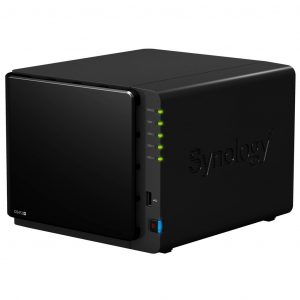Why We Love Synology’s Cloud Station
At CommQueR.com, we work on a lot of files – Photoshop files for the next news image, audio files of our expert interviews, videos for our video tutorials, music files just for listening at the office, etc. As we have at least five people working every day, we need to frequently share our files in our local area network, but we also need to access our files on the go when we cannot be at the office.
We need a solution that would store, back up, and sync our data among a variety of computers. We knew a NAS was the way to go, and we ended up choosing a Synology DiskStation 212+.
Getting The Terabytes In
We have a couple of Synology DiskStations here at our office: one works as our primary “machine,” which we use for file sync and collaboration, while others are just for backup. The backup machines are equipped with Western Digital Red 3TB NAS hard drives, which are built particularly for NAS storage systems.
We have a bay with four slots, so there is enough space for redundant backups and if one hard drive fails, it can easily be replaced. Currently, we’re using the automatic Hybrid RAID offered by Synology DiskStation, which allows one hard drive to fail without data loss.

This is an acceptable risk for us, and it allows us to take care of other things instead of worrying about complex RAID setups. The advantage of the Hybrid RAID is that it doesn’t “waste” hard drives (see image below).
What Does Cloud Station Do?
The best thing about Cloud Station is that it also allows “technically challenged” people to have access to our NAS as it essentially works like Dropbox. The first thing you have to do is install Cloud Station from the Packages Manager to activate it on your Synology.

After you’ve activated Cloud Station, you can configure its settings, add users, and edit privileges.

Advantages of Using a Private Cloud Syncing Solution
One of the main advantages of using a private cloud solution is that it is, well, private. Especially when you have very sensitive business data, you don’t have to share this information with a cloud storage company. Dropbox’s security issues are well known, and if you can encrypt and keep your files in your network, that’s certainly the better option.
Of course, there are disadvantages, too. When you opt for a private-cloud storage solution, you have to manage everything on your own. There is no support to help you when a configuration suddenly doesn’t work anymore:
Advantages
- Your files remain in your hands
- You can take care of encryption yourself
- You can grant access to a number of users
- Private cloud solutions are cheaper for teams
Disadvantages
- You have to do everything on your own
- You have to be a bit more tech-savvy
- You have to take care of backups yourself
Conclusion
Synology’s DiskStation, which has the extra service Cloud Station, allows us to easily manage users and grant rights or revoke those of freelancers who don’t work for us anymore. We can determine exactly who sees what in our network, and file sharing is very easy.
As multiple people work on the same files, a file-synchronization service that manages file conflicts well (such as when two people accidentally edit the same document) becomes necessary. Of course, Synology is not the only NAS that offers these features. A couple of alternatives are available out there – for example, QNAP.
We would love to hear your feedback! What is your setup, and how do you use NAS?
